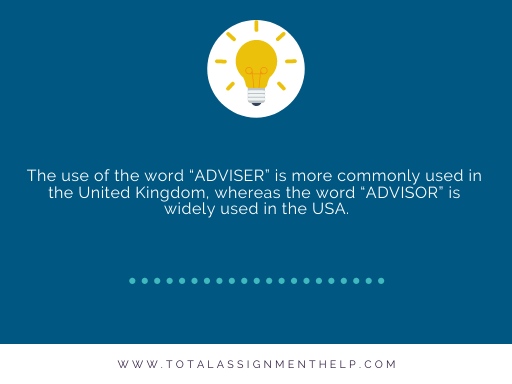Advisor Vs Adviser: The Basic Difference

We have quite often observed that people find it confusing to differentiate between advisor vs. adviser. Even after the professional enters the corporate world, the confusion prevails. The person that is a registered investment consultant within the finance sector is an adviser. Contrary to this, consultants within the real-estate and other respective field are advisors. The queries regarding these two words have been raised on multiple occasions by students and customers, prompting us to develop a detailed article that outlines the differences between Advisor vs. Adviser and situations where each is applicable. The words have created chaos among many scholars in their academic assignment and evaluation with most failing to strictly abide by the International Financial Derivative Regulation and guidelines relating to the use of the terms. The use of adviser is more commonly used in the United Kingdom, whereas the word advisor is widely used in the USA. Though the argument relating to the proper use of each word is not given much relevance by linguistics, we will explore the literal definitions and contextual differences between advisor vs. adviser.
What are the Contextual differences between Advisor vs. Adviser?
The individual who provides the other person with a piece of advice or any guidelines could be called an advisor as per Normal notions in the United Kingdom. In contrast, a person who is related to the legal or financial sectors he would be referred to as an adviser. For individuals with the contextual awareness relating to the terms can use both the words without any confusion while drafting literature.
To better understand the differences, we will perform an in-depth review of the differences between advisor and adviser. As mentioned earlier, both words advisor vs. adviser signify a person who retains thorough knowledge of a specific topic or stream. The person should also maintain multi-disciplinary qualities and expertise to be classified under the advisor/ adviser category. A mentor or coach falls under advisor or adviser. Individuals who fall under the class of advisor vs. adviser are not task-specific consultants but more of multi-disciplinary and knowledgeable individuals. Apart from offering consultancy, individuals falling under advisor/ adviser hold all the essential qualities of a leader and could be considered as a role model.
If the origin of advisor vs. adviser is checked, its derivation dates back to the early 16th century. When viewed from the demographic and geographical perspective, advisor vs. adviser, it could be noted that the word adviser was always popularly used word widely used in both the written and oral languages. Though if its use is considered from North America, the word Advisor has gained much more prominence and is widely used by the public. Though when advisor vs. adviser is regarded from a literal usage perspective, the instance of adviser is more commonly used than that of advisor in general communication. Both the words advisor vs. adviser could be brought under the classification of etymological twin cognates, which implies that the words could be used, based on situations having a similar contextual background.
Advisor vs. adviser falls under the classification of etymological twin cognates. This means they cannot be used simultaneously in the same text as, which could result in severe contextual indifferences. As mentioned in the above section, both advisor vs. adviser refers to a person who is available to provide practical guidelines or tips to a person in an area of need. Both words had originated in the early16th century, though it could be perceived that the term adviser was derived before advisor. The suffixes er and or arising from the root words of different languages. The root word er has been derived from the German language, though the suffix root word of or is derived from Latin. Across the world, the term adviser is more commonly used by people. If both of the terms are considered as a noun, they could be termed as advice and advice whereby the term advisor could be closely related to words like advisory and supervisory.
In this report, we have discussed the contextual difference in between the terms Advisor vs. Adviser whereby it has been determined that adviser is not commonly used and is very hard to differentiate from advisor. To use these terms correctly, the writer should have in-depth knowledge regarding the literal meaning where the term adviser could be phonetically pronounced as /ədˈvʌɪzə/.
Get Trustworthy assignment service from totalassignmenthelp.com.
If you are facing difficulty drafting an assignment for your academic evaluation, feel free to approach totalassignmenthelp.com, which delivers top quality solutions. We have observed that many of the students find it very difficult to draft a perfect assignment that has been critically researched, has proper grammar and sentence structuring. Along with these features, the student needs to demonstrate advance technical and theoretical knowledge of the assignment topic being prepared. You could review the sample solutions provided on our official website to ascertain the quality and authenticity of the service offered by our experts. No matter what the topic students are assigned, our seasoned experts are well prepared to solve the problem. We hope the in-depth analysis and explanation relating to the differences of Advisor vs. Adviser and when they should be used are now clear, and you would be able to use each word in the correct context.






